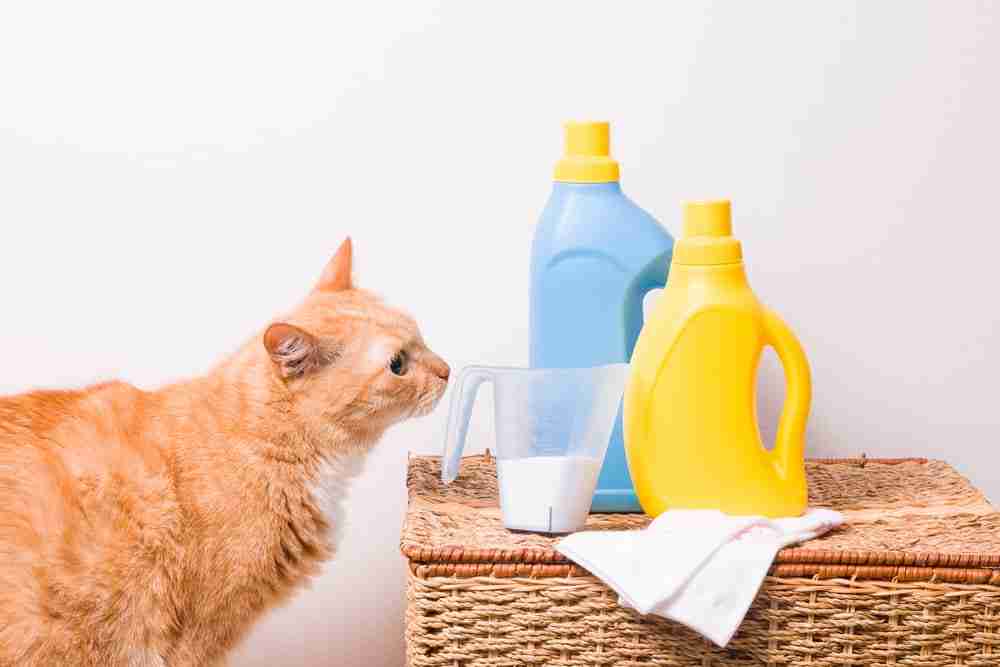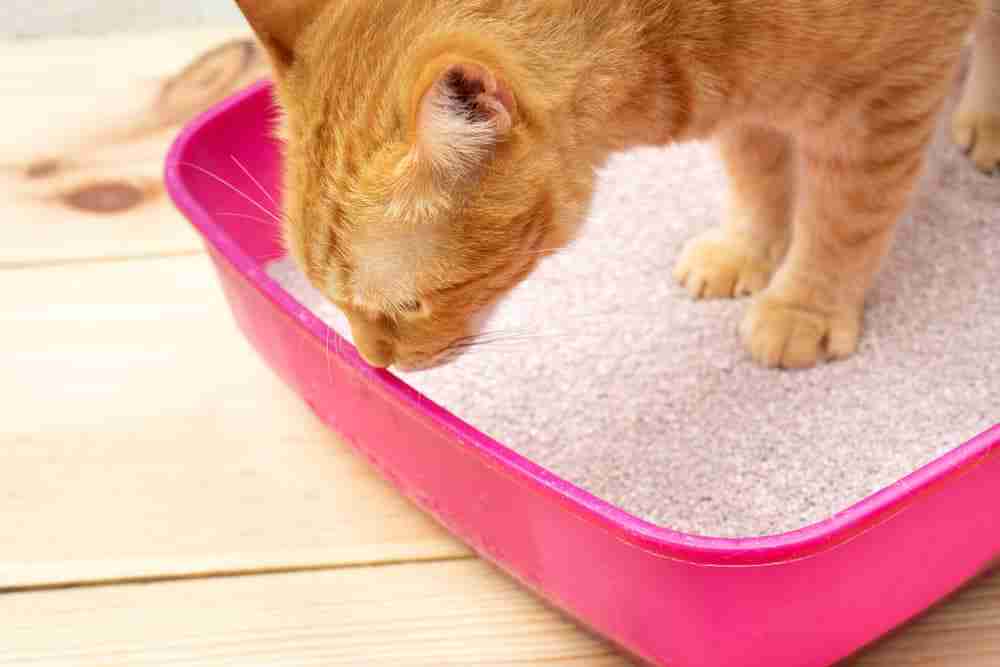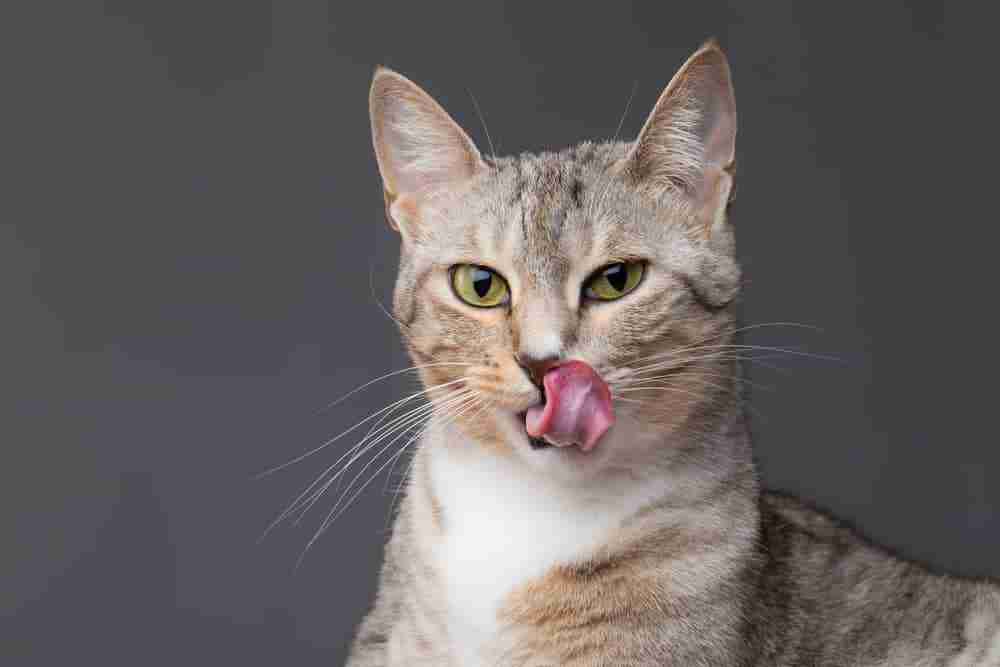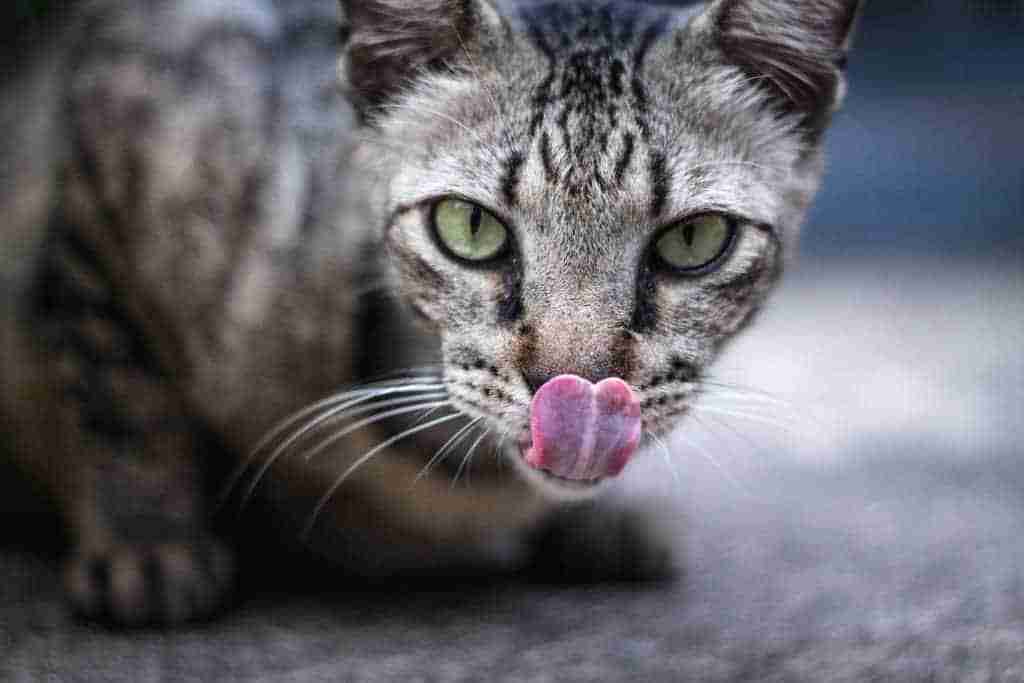You finish your morning chores and end it with cleaning the kitchen floor. With the pandemic still an issue across the world, you decide to add a little bleach to your normal floor cleaner; it couldn’t hurt, right?
After finishing up with your germ-killing duties, you notice your orange tabby comes wandering into the kitchen. She stops at the doorway, bending down to sniff the floor.
- Why Does My Cat Love The Smell Of Bleach?
- What Are The Effects Of Bleach Poisoning On Cats?
- What Are The Signs And Symptoms Of Bleach Toxicity In Cats?
- All Types Of Bleach Are Toxic To Cats
- What Are The Effects Of Skin And Eye Contact In Cats?
- What Are The Effects Of My Cat Ingesting Bleach?
- How Do I Protect My Cat From Bleach?
- What To Do If Your Cat Consumes Bleach?
She wanders across the floor over to your mop and bucket and starts investigating? What’s with this behavior? It isn’t like you cleaned up food off the floor. Somehow your cat is strangely attracted to the bleach in your new cleaner blend. Clearly, bleach doesn’t keep cats away!
Why do cats like bleach? What is going on?
Why Does My Cat Love The Smell Of Bleach?
Vets and animal scientists have no idea why cats display this attraction. There might be some chemical present in bleach, probably chlorine, causing the appeal for your feline.
Why on earth would your cat like the smell of chlorine? Cats have a sense of smell that’s many times stronger than ours, so why would they find these scents appealing?
Some experts suggest it might produce the same pheromone response in cats they get from snacking on some catnip.
Some owners report their cat exhibits the same behavior around bleach as they do catnip. Your kitty might start purring, drooling, or rubbing on treated, disinfected surfaces.

What Are The Effects Of Bleach Poisoning On Cats?
Homeowners that understand bleach toxicity in humans might find they experience some dismay at their kitty’s affection towards the chemical. Won’t exposure cause harm to your cat? What if they get sick?
The reality is the same dose of the chemical in the water drying on your kitchen floor is harmless to your cat. Even if they start licking the floor, they probably won’t experience bad side effects.
Your cat might likely take a few big licks at most and decide to move on. However, if your cat were to lick up a large concentration of bleach, it would be like you swallowing it – you need to seek immediate medical attention.
However, cats aren’t stupid, and it’s highly unlikely they’ll consume enough that warrants a trip to the vet.
What Are The Signs And Symptoms Of Bleach Toxicity In Cats?

If somehow, your cat comes back and keeps licking dried the cleaner off the floor, they might develop some toxicity to it. As we mentioned, this behavior is rare, but it does happen.
First, you’ll notice the same effects in your cat that you see after feeding them catnip. They’ll act friendly and playful. However, if they have over-exposure, it results in many of the same toxicity symptoms in humans.
- Skin irritation
- Vomiting
- Stomach pains
- White around their mouth
- Meowing in discomfort
All Types Of Bleach Are Toxic To Cats
Homeowners already understand that the chemical is available in a variety of chlorine concentrations. Some rely on large amounts of chlorine, while others have chlorine-free or low-chlorine formulations.
Chlorine is supposedly the whitening process’s primary ingredient, although its efficacy in whitening fabrics is debatable. In any case, whether you have a chlorine-free or high-chlorine product, your cat will still find the concoction appealing.
However, while your cat finds all of the bleach products appealing, those with higher chlorine contents are more dangerous to your feline’s health.
What Are The Effects Of Skin And Eye Contact In Cats?
If your kitty decides to have a quick roll on the floor, their fur will pick up some diluted bleach particles. If the particles make it onto their skin, they’ll experience low-grade irritation.
It’s nothing to worry about, and the irritation won’t last more than a day. However, depending on the concentration, you might notice your cat’s fur goes a shade lighter or has a whitish sheen to it.
It’s better to wipe them down with a damp cloth if you can. The last thing you need is them rolling on your new couch, tainting the color.
Bleach gets its power from hydrogen peroxide, the same ingredient found in hair dye. If the cat does come in contact with pure bleach, rinse down the affected area and check for irritation.
In most cases, chlorine-free varieties also create skin irritation in your cats.
While the effects of bleach getting onto your cat’s skin are minimal amounts of irritation, make sure they don’t get it in their eyes. Even a small amount can cause severe issues with your cat’s eyes.
You’ll notice your cat pawing at their eyes. Upon examining them, you’ll see redness and tearing in the affected eye.
The cat will paw and meow and blink repeatedly. If you notice this behavior, rinse out the eye as much as possible, and immediately take them to the vet.
What Are The Effects Of My Cat Ingesting Bleach?

It’s highly unlikely your cat will ever ingest pure bleach, but it could happen. All they need to do is start licking the bottle cap, and they’re in trouble.
If your cat ingests the smallest amount, it results in an immediate reaction in your cat. They’ll start coughing and choking, looking to spit it out.
They’ll also start licking their cheeks and face in an attempt to get the bleach off the tongue. The ingredients in the chemical, like hydrogen peroxide, produce a vomiting reaction in your cats as soon as it enters their mouth.
Fortunately, this prevents them from swallowing large amounts. However, some brands have a sticky formulation, and your cat could end up ingesting small amounts of it as they attempt to clean their tongue.
If you come back to the kitchen after cleaning the floor to find your cat in the middle of the room vomiting, take them to the vet right away. The faster you act, the better.
How Do I Protect My Cat From Bleach?
The smell of bleach might be irresistible to your cat, and it’s challenging to keep them away from it. If you find your cat likes to come and play with you during your cleaning duties, keep them out of the room.
Close the door, or put them in their crate or carrier while you complete your cleaning tasks or laundry duties. We recommend using a cupboard to store your chemical cleaners. Place it on the top shelf, rather than on the floor.
If your cat complains after putting them in the carrier, give them some catnip. The catnip provides the same type of distraction as the chemical cleaner, and they’ll clam down, leaving you to your chores.
Remember to let them out of the carrier or room after you finish and the floor is dry. Leaving your kitty alone for too long cooped up in a room will irritate them.
After cleaning, make sure you pack the chemical away safely and remove any cleaning products your cat can investigate and examine.
Keep your cat away from the room until the surfaces dry. Dried bleach on floors is less toxic than in a liquid format. Your cat might stomach several licks without any issues.
If you find your cat licking the floor, observe them for signs of vomiting or licking that signal bleach poisoning.
What To Do If Your Cat Consumes Bleach?
If your cat consumes the cleaner, then you need to stay calm. Follow this step-by-step process before taking them to the vet.
Step 1 – Wash the chemical off your cat.
Step 2 – Assess the cat’s response.
Step 3 – If none of the signs of toxicity appear, watch them closely for a few hours.
Step 4 – If signs of poisoning occur, call your vet.
Step 5 – Take your cat to the vet based on their advice.
When you call the vet, they’ll want to know what kind of bleach your cat consumed. It’s common for owners to find themselves panicking, so remain calm.
Your cat relies on your level-headedness in this situation, so don’t panic.
The old saying of trying to get your cat to drink milk is a bad idea. Cats are mostly lactose intolerant, and the milk causes further digestive discomfort.
Don’t let your cat try to drink water, as this could also complicate things. In a severe case of bleach poisoning, the best option is to rush your cat to the vet. Call the vet before or on the way to let them know you’re coming and what to expect when you arrive.
